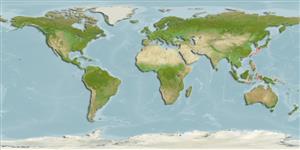Classification / Names
Common names | Synonyms | Catalog of Fishes(genus, species) | ITIS | CoL | WoRMS | Cloffa
Teleostei (teleosts) >
Pleuronectiformes (Flatfishes) >
Poecilopsettidae (Bigeye flounders)
Etymology: Poecilopsetta: Greek, poikilos = with a lot of colours + Greek, psetta = grouper (Ref. 45335); dorsialta: From the long first dorsal fin ray and the height of the dorsal fin [dorsi = dorsal; alta = high].
Environment: milieu / climate zone / depth range / distribution range
Ecology
Marine; bathydemersal; depth range 247 - 320 m (Ref. 41109). Deep-water
Western Central Pacific: Philippines.
Size / Weight / Age
Maturity: Lm ? range ? - ? cm
Max length : 11.2 cm SL male/unsexed; (Ref. 41109); 7.5 cm SL (female)
Short description
Identification keys | Morphology | Morphometrics
Dorsal soft rays (total): 58 - 62; Anal soft rays: 45 - 52; Vertebrae: 39 - 40. First dorsal fin ray long, 1.79-2.01in HL. Pelvic fin rays on ocular side long, 1.56-1.95 in HL. Paired fins without scales. Caudal fin rays 20, 14 medial rays branched. Ocular side with large ctenoid scales; blind side with cycloid scales. Mouth oblique, symmetrical. Lateral line with ctenoid scales; absent on blind side (Ref. 41109).
Life cycle and mating behavior
Maturity | Reproduction | Spawning | Eggs | Fecundity | Larvae
Guibord, A.-C. and F. Chapleau, 2001. Poecilopsetta dorsialta: a new species of Poecilopsettidae (Pleuronectiformes) from the Pacific Ocean. Copeia 2001(4):1081-1086. (Ref. 41109)
IUCN Red List Status (Ref. 130435: Version 2024-1)
Threat to humans
Harmless
Human uses
Tools
Special reports
Download XML
Internet sources
Estimates based on models
Preferred temperature (Ref.
123201): 8.9 - 13.5, mean 12.3 °C (based on 22 cells).
Phylogenetic diversity index (Ref.
82804): PD
50 = 0.5000 [Uniqueness, from 0.5 = low to 2.0 = high].
Bayesian length-weight: a=0.01995 (0.00906 - 0.04395), b=3.01 (2.83 - 3.19), in cm total length, based on all LWR estimates for this body shape (Ref.
93245).
Trophic level (Ref.
69278): 3.5 ±0.4 se; based on size and trophs of closest relatives
Fishing Vulnerability (Ref.
59153): Low vulnerability (10 of 100).
